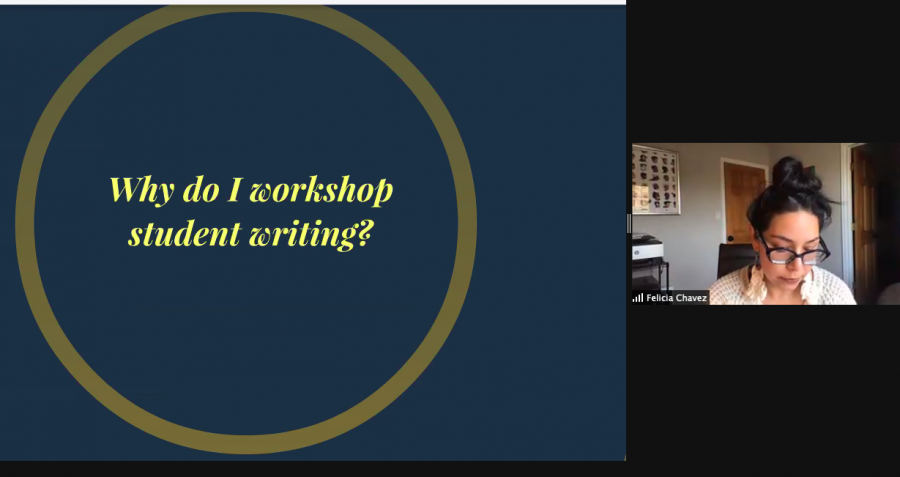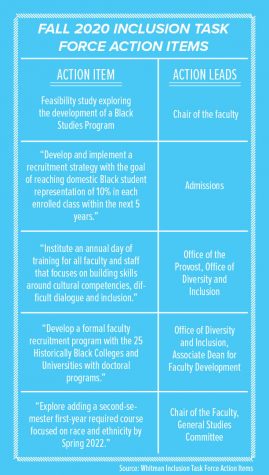Empowering voices with anti-racist pedagogy
October 29, 2020
In the latest event in Whitman’s academic theme, Race, Health and Violence, author and award-winning educator Felicia Rose Chavez asked faculty and staff a fundamental question: “Why do you workshop student writing?” Through her presentation and a short writing workshop, Chavez showed attendees that the goals of workshopping student writing are impeded by traditional, racist methods which require the author’s silence. According to attendees of the event on Oct. 22, Chavez’s ideas provide a roadmap for anti-racist pedagogy that empowers their students’ voices, rather than silencing them.

Attendees prepared for the event by reading the introduction of Chavez’s book “The Anti-Racist Writing Workshop: How to Decolonize the Creative Classroom,” which will be released Jan. 2021. In her book as well as her presentation, Chavez draws from her experiences in traditional workshops and research to argue that, by silencing authors, the traditional workshop model maintains the dominance of the workshop leader, of student’s critiques of the author in service of that leader’s expectations, and of intellectual and creative inheritances rooted in white literary traditions.
Chavez said, “A lot of times people say, ‘Well what makes it [the alternative method] anti-racist?’ I want to be very clear about that. It’s a pedagogy of deep listening while the traditional model is one in which the writers themselves have no voice. That’s the great irony of our country’s writing programs; under this traditional model, students of color especially aren’t able to exercise voice…[My approach] is an alternative rooted in love that really promotes deep listening, real mentorship and a meeting of humanity between artistic allies. It roots out the excess of domination and control that we think equates with authority in the classroom.”
Over years of higher education, teaching and serving as Scholar-in-Residence in Creativity and Innovation at Colorado College, Chavez developed an alternative model centered on the author’s goals and needs. In Chavez’s model, the author directs the workshop, which allows them to integrate their lived experience into the presentation of their work and articulate their personal vision. Other students ask questions and can provide opinions, but the author moderates the discussion and always has the option to tell another person that they do not want to hear their opinion.
Chavez said, “It took me about 30 years to be able to just say ‘no’ when I wanted to say ‘no.’ That is a deep-rooted issue for a lot of folks, no matter what your personal background is. It’s especially problematic for people of color, women, queer folks and working-class folks. We look at a creative classroom, and we see a contained experience. When, really, the heart of it is owning your own voice, owning it on the page and owning it aloud in the classroom, and feeling the agency to be able to express yourself.”
Jenna Terry, Whitman professor of Rhetoric, Writing and Public Discourse and Coordinator of the RWPD 170 program, plans to integrate Chavez’s methods into her spring classes. “I’m going to inspire my [First-Year Seminar] students to create a vision using the course material and something more contemporary that they’re interested in. Chavez’s notion of honoring the writer’s vision I think is very important in creative writing and in this investigative, argument-making writing that we’re doing in the spring First-Year Seminar. I think that teaching students how to develop a writer’s statement that they present to the class to before any workshop, to preface the work as they wish, will be so useful when their vision is something that we are explicitly working on,” said Terry.
To Lydia McDermott, Whitman Department Chair and Associate Professor of Rhetoric, Writing and Public Discourse, and Director of the Center for Writing and Speaking, Chavez’s ideas
affirm her continued effort to encourage self-advocacy among writers. McDermott said, “I think that the most important thing is respecting each individual author’s voice and their autonomy over their text. There also needs to be a concerted effort to foreground writers of color as opposed to just a concerted effort not to dismiss them.”
As McDermott and Terry note, diverse and flexible curricula are vital to Chavez’s anti-racist teaching. To Chavez, studying diverse writers allows students to discover beyond what is
often considered canonical. Chavez encourages professors and students alike to reflect on where their aesthetic preferences and ideas of “good” writing stem from. Terry said, “I want to help students identify not only the creative and intellectual inheritance that they have at one moment and that they want to address at one moment, but how that changes through the course of the semester. That seems like a fantastic reflective tool that will help an entire class enact anti-racist practices and help everybody be ready to learn as whole people, without trying to ignore a portion of themselves.” After she presented to the attendees and asked them to free-write in response to various questions, Chavez led a 25-minute workshop of one attendee’s 75-word piece of writing.
“There was, among faculty and staff, a bit of hesitancy about how to proceed and how to do it right,” Chavez said. “There was resistance to begin with and I love that. I love that we’re able to
just say that. The thing about this alternative workshop model is that it’s going to feel weird because it’s different. But once we relaxed into the steps, there came a point where the author felt some enlightenment about the benefits of the workshop model.”
In her most recent first-year seminar, 3 of Chavez’s 15 students told her that they learned empathy in her class. This directly speaks to the impact of Chavez’s writing workshop model and anti-racist pedagogy, which Whitman faculty and staff were lucky to learn about. Chavez said, “I don’t know how many classes students leave saying, ‘What I learned was not grammar, the 5-paragraph essay, or how to write a strong intro, but, instead, empathy, peace, ownership, pride.’ That’s the goal.”








